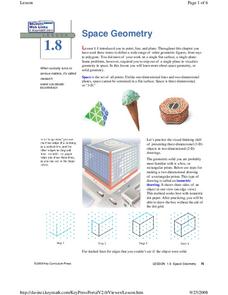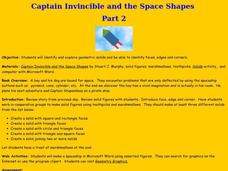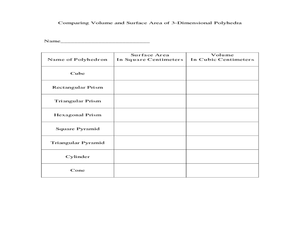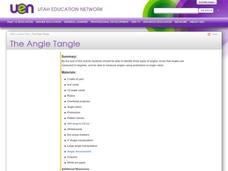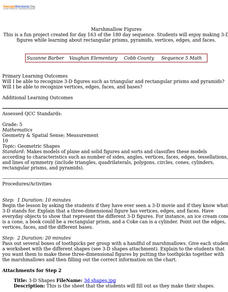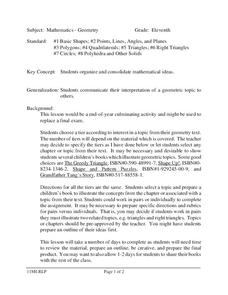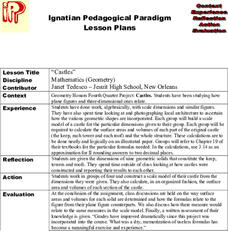Curated OER
Marshmallow Geometry
In this three-dimensional shapes geometry lesson, learners identify geometric solids and name their properties. They define "face," "edge," and "vertex," and construct geometric solids using marshmallows as vertices and toothpicks as edges.
Curated OER
Space Geometry
Students explore points, lines and planes as it relates to geometry. In this geometry lesson plan, students analyze space and explain wy it is 3-D and not flat or 2-D. They solve problems involving volume and 3-D shapes.
Curated OER
Geometry and Tony Smith Sculpture
Learners respond to Tony Smith's sculpture as art and brainstorm about math concepts inherent in his work. They create a sculpture with polyhedra nets, calculate the cost of covering sculpture in gold, and write an exhibit label for...
Curated OER
Writing Takes Shape!
Students read The Greedy Triangle and discuss geometric solids. In this geometry lesson, students list the geo-solids in the world and create a graphic organizer to show where geo-solids exist.
Curated OER
Sphere Dressing
Geometric design makes a fashion statement! Challenge learners to design a hat to fit a Styrofoam model. Specifications are clear and pupils use concepts related to three-dimensional objects including volume of irregular shapes and...
Curated OER
Shape All Around
Students investigate solid shapes. In this geometry lesson, students take pictures of solid shapes and classify their pictures according to the vocabulary terms: edge, face and vertex. Students present their findings to the class.
Curated OER
Captain Invincible and the Space Shapes
Students recognize the features of geometric shapes. In this geometric shapes instructional activity, students listen to Captain Invincible and the Space Shapes. Students create solid figures with marshmallows and toothpicks. Students...
Curated OER
Shape Hunt
Students explore two-dimensional and solid shapes. For this shapes and patterns geometry lesson, students work with a partner to create identifiable objects using tangrams. Students describe the attributes of their shape and their...
Curated OER
3-D Attributes
Students explore geometric solids. In this geometry lesson, students listen to the book The Greedy Triangle by Marilyn Burns, then work in groups to sort geometric solids into various categories. Students define geometric solids...
Curated OER
The Value of Volume
Students measure the perimeter and area of their polygons. For this geometry lesson, students calculate the volume and area using the correct tools. They calculate the time and temperature and the perimeter and side lengths of triangles.
Curated OER
Polydron Fun
Learners investigate nets as they relate to volume and area. In this geometry instructional activity, students use nets as a visual to deepen their understanding of surface area and volume of objects. They make conjectures about...
Curated OER
Pyramids and Prisms: Guler's Formula
Sixth graders detect and categorize the attributes of geometric shapes to solve problems. In this geometry lesson, 6th graders construct a variety of polyhedra. Students recognize the relationships between two dimensional and three...
Curated OER
Geometry Slideshow
Sixth graders create slideshows of geometric terms. They use images taken with digital cameras or scanned from magazines.
Curated OER
Geometry, Shapes and Public Sculpture
Students explore characteristics of geometric shapes. They observe geometric shapes and forms in public sculpture. Students create a unique sculpture of their own using basic three dimensional shapes. Additional cross curriculum...
Curated OER
Angles
Fourth and fifth graders investigate angles and name them according to the criteria for obtuse, acute, and right angles. They examine a human-made yarn pattern on the floor of their classroom and identify angles, vertices, and types of...
Curated OER
Nature's Polyhedrons
Students are introduced to polyhedrons through using straw models to explore geometric solids and constructing Christmas tree ornaments using Epsom salt crystals. Students will view interactive videos and investigate and retrieve...
Curated OER
Investigation-On the Surface
Students compute the surface area of 3 geometric solids to determine the shape of package that would require the least amount of paper to wrap. In this geometry lesson, students work on a two-question assessment embedded in the plan. The...
Curated OER
Investigating: Finding the Volume
Sixth graders explore geometry by utilizing colored cubes in class. In this volume lesson, 6th graders identify the different shapes they can create using their colored cubes and identify the formula for finding volume. Students create...
Curated OER
Using Geometric Shapes in Architecture
Third graders identify two and three dimensional shapes used in architectural designs by viewing images on the Internet. In this geometry lesson, 3rd graders create their own building designs and identify the geometric shapes that will...
Curated OER
Spacemobiles
Aspiring astronauts construct a space vehicle using cylinders, cones, spheres, and rectangular prisms. This is an engaging method of learning about three-dimensional shapes. Note that the word cylinder is constantly misspelled in the...
Curated OER
Marshmallow Figures
Students enjoy making 3-D figures while learning about rectangular prisms, pyramids, vertices, edges, and faces. After a lecture/demo, students use marshmallows, toothpicks and a worksheet imbedded in this lesson to create 3 dimensional...
Curated OER
Basic Shapes
Students create books about shapes. In this shape lesson, students select a topic such as points, lines, angles, planes, polygons, quadrilaterals, triangles, circles, and polyhedra. In groups, they create an illustrated children's book...
Curated OER
Castles
Students create a scale model to a castle using the dimensions they were given. They calculate the surface areas and volumes of each section of their castle.
Curated OER
Color Me Square
Second graders identify and describe basic geometric solids. Working as a class, 2nd graders describe geometric solids using the proper vocabulary and counting faces, bases, corners, and edges. In pairs, students use a computer drawing...



